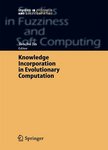版权所有:内蒙古大学图书馆 技术提供:维普资讯• 智图
内蒙古自治区呼和浩特市赛罕区大学西街235号 邮编: 010021

丛 书 名:Studies in Fuzziness and Soft Computing
版本说明:1
I S B N:(纸本) 9783540229025;9783642061745
出 版 社:Springer Berlin Heidelberg
出 版 年:2005年
页 数:XIII, 548页
主 题 词:Applications of Mathematics Mathematical and Computational Engineering Artificial Intelligence
学科分类:08[工学] 0835[工学-软件工程] 081202[工学-计算机软件与理论] 0812[工学-计算机科学与技术(可授工学、理学学位)]
摘 要:Incorporation of a priori knowledge, such as expert knowledge, meta-heuristics and human preferences, as well as domain knowledge acquired during evolu tionary search, into evolutionary algorithms has received increasing interest in the recent years. It has been shown from various motivations that knowl edge incorporation into evolutionary search is able to significantly improve search efficiency. However, results on knowledge incorporation in evolution ary computation have been scattered in a wide range of research areas and a systematic handling of this important topic in evolutionary computation still lacks. This edited book is a first attempt to put together the state-of-art and re cent advances on knowledge incorporation in evolutionary computation within a unified framework. Existing methods for knowledge incorporation are di vided into the following five categories according to the functionality of the incorporated knowledge in the evolutionary algorithms. 1. Knowledge incorporation in representation, population initialization, - combination and mutation. 2. Knowledge incorporation in selection and reproduction. 3. Knowledge incorporation in fitness evaluations. 4. Knowledge incorporation through life-time learning and human-computer interactions. 5. Incorporation of human preferences in multi-objective evolutionary com putation. The intended readers of this book are graduate students, researchers and practitioners in all fields of science and engineering who are interested in evolutionary computation. The book is divided into six parts. Part I contains one introductory chapter titled A selected introduction to evolutionary computation by Yao, which presents a concise but insightful introduction to evolutionary computation.